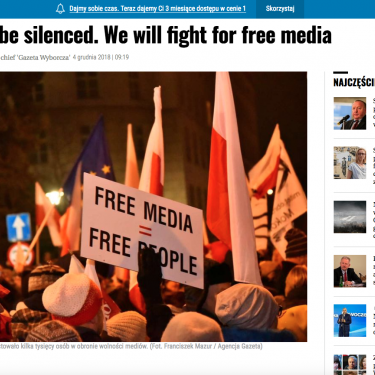Polish authorities stepping up harassment of independent media

Reporters Without Borders (RSF) calls on the Polish authorities to end their harassment and attempts to intimidate independent journalists and media outlets, which they have stepped up in recent weeks.
Adam Glapiński, the president of the National Bank of Poland, and Senator Grzegorz Bierecki, a member of the ultra-conservative ruling Law and Justice party, threatened to sue five journalists with the independent newspaper Gazeta Wyborcza last week if they did not remove seven allegedly defamatory articles from the newspaper’s website.
The articles in question implicate Glapiński and Bierecki in a major alleged corruption scandal within the Polish Financial Oversight Agency – revelations that forced the head of the agency to resign three weeks ago.
Just a few days before, on 23 November, members of the Internal Security Agency (ABW) went to the home of Piotr Wacowski, a reporter and cameraman with the commercial television channel TVN, to give him a summons to appear before prosecutors on suspicion of “spreading Nazi ideology.”
The pretext for this investigation was video footage of a Nazi salute that Wacowski gave to avoid arousing suspicion while doing an undercover report on a neo-Nazi gathering that TVN broadcast last January. The footage of Wacowski’s salute was somehow obtained by the pro-government news website wpolityce.pl.
TVN immediately objected, with the support of the Polish Association of Journalists (TD), which wrote a letter describing the investigation as “absurd.” The national prosecutor’s office backed down the next day, announcing that it would be “premature to prosecute the TVN cameraman” and that it was referring the case to the regional prosecutor’s office in the city of Katowice for further consideration.
As TVN is owned by the US media group Discovery, a US reaction was not long in coming. US ambassador Georgette Mosbacher wrote to the Polish prime minister voicing “deep concern” about the way TVN was being treated saying she hoped the authorities would “refrain from attacking, let alone prosecuting, independent journalists.”
In a visit to the Polish parliament on 21 November, Mosbacher had already expressed concern about legislative plans to “re-Polishize” the country’s press by imposing a limit on the level of foreign capital in Polish media companies. If there was one thing that could jeopardize relations between the United States and Poland, it was an attack on media freedom, she said.
It was in this already tense climate that Newsweek Polska investigative reporter Wojciech Cieśla was summoned for questioning by prosecutors on 29 November for allegedly revealing the address of constitutional court president Mariusz Muszyński – a former domestic intelligence agent and Law and Justice member – in one of his articles. In fact, the article did not give the address; it just described its luxurious location.
“All this harassment is part of a campaign that the Polish government has been waging against independent media outlets since 2015, a campaign designed to economically throttle critical media, prevent journalists from doing investigative reporting, and ‘re-Polishize’ the media landscape in the near future,” said Pauline Adès-Mével, the head of RSF’s European Union and Balkans desk. “The Polish government has transformed the state-owned media into a propaganda tool and is trying to do the same with investigative reporters and independent media. RSF supports the call by Gazeta Wyborcza to defend press freedom and not kowtow to the authorities.”
Poland has been falling steadily for the past several years in RSF’s World Press Freedom Index and is now ranked 58th out of 180 countries.



